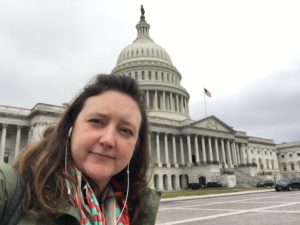This is an Eval Central archive copy, find the original at rka-learnwithus.com.
I wrote this blog post two weeks ago before coronavirus had changed our world so drastically. Museums Advocacy is more essential now than ever. Please consider how you can be an effective museum advocate, and see AAM’s resources here: https://www.aam-us.org/2020/03/19/urge-congress-to-support-museum-community-economic-relief/
“What are you doing here?” This was the question that greeted me from a colleague prior to the welcome session for Museums Advocacy Day 2020. I was both surprised by and prepared for this question, as I had wondered whether Museums Advocacy Day was a place for me too.
This year was the first time I had participated in Museums Advocacy Day. I have felt particularly motivated to participate over the last few years, realizing that I wanted to learn how to ensure that good and valid studies about the impact of museums (particularly on visitors—communities, students, etc.) are on policymakers’ radars. The theory goes that data and stories are important to policymakers. As an authority in museum data, it seemed to make sense that I be there to share my knowledge. Evaluators want nothing more than to ensure data is useful. So, Museums Advocacy seemed to me to be a natural extension of our work as evaluators. We are not just talking the talk but walking the walk by taking the data and stories about museums directly to Capitol Hill.

I did have several hesitations going into Museums Advocacy Day though. First and foremost, I do not work for a museum directly. As an advocate, do I appear self-serving as museums and some of the grant agencies for which we are advocating sustain our business? Additionally, we work nationwide so is it odd to advocate to my state senators (although we do work within my state currently, and I was able to share stories about students talking about a work by Ai Wei Wei and data about parent’s perceptions of digital initiatives for children)? But moreover, is it odd to advocate to my district representative (since we don’t currently work within my district)? Furthermore, leading up to Museums Advocacy Day, I only knew of one other evaluator like myself who attends (Elsa Bailey), and then encountered only one other evaluator while there (Monae Verbeke). So, the nagging little voice in my head through the course of the prep day for Capitol Hill continued to chide me: what are you doing here?
After finishing the day of prep and meeting with my senators and representative on Capitol Hill, I can say I learned a ton and am very happy to have participated. However, I don’t know that I answered the question about whether Museums Advocacy Day is a place for me. Rather, my experience exploded the question to wonder:
- Who should be an advocate?
- Or, who is best able to be an effective advocate?
For example, many of the advocates from my state are students in museum programs. Are they effective advocates as they don’t yet have the firsthand experience to speak about the impact of museums on people? Furthermore, some advocates are not actually living within the districts for which they advocate. Are they effective advocates? For example, while I don’t work with any of the museums in my district, I do rely on them as a parent of student at a Title 1 public school. Our school takes fieldtrips to and sponsor in -school assemblies from many of these museums. Therefore, I felt confident in advocating for them through this lens, but what about those who could not rely on this intimate knowledge of a district?
I am so grateful to have participated in Museums Advocacy Day as it was a very empowering experience, and I learned so much. However, this bigger question of who should participate in Museums Advocacy will sit with me for now.
The post Who should participate in Museums Advocacy? appeared first on RK&A.